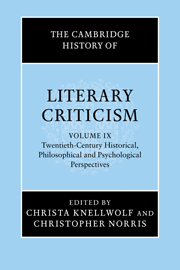Book contents
- Frontmatter
- Introduction
- HISTORY
- MARXISM AND POST-MARXISM
- 6 Marxism and literary criticism
- 7 Marxism and poststructuralism
- 8 Adorno and the early Frankfurt School
- 9 The ‘German–French’ debate: critical theory, hermeneutics and deconstruction
- 10 Post-war Italian intellectual culture: from Marxism to cultural studies
- FROM CULTURAL POETICS TO CULTURAL STUDIES
- PSYCHOANALYTIC APPROACHES
- GENDER AND SEXUALITY
- COLONIALISM, POST-COLONIALITY, NATION AND RACE
- MODERNITY AND POSTMODERNISM
- PHILOSOPHY, AESTHETICS AND LITERARY CRITICISM
- INTERDISCIPLINARY APPROACHES
- Bibliography
- Index
- References
6 - Marxism and literary criticism
from MARXISM AND POST-MARXISM
Published online by Cambridge University Press: 28 March 2008
- Frontmatter
- Introduction
- HISTORY
- MARXISM AND POST-MARXISM
- 6 Marxism and literary criticism
- 7 Marxism and poststructuralism
- 8 Adorno and the early Frankfurt School
- 9 The ‘German–French’ debate: critical theory, hermeneutics and deconstruction
- 10 Post-war Italian intellectual culture: from Marxism to cultural studies
- FROM CULTURAL POETICS TO CULTURAL STUDIES
- PSYCHOANALYTIC APPROACHES
- GENDER AND SEXUALITY
- COLONIALISM, POST-COLONIALITY, NATION AND RACE
- MODERNITY AND POSTMODERNISM
- PHILOSOPHY, AESTHETICS AND LITERARY CRITICISM
- INTERDISCIPLINARY APPROACHES
- Bibliography
- Index
- References
Summary
‘Always historicise!’ Fredric Jameson famously wrote, adding that this was ‘the one absolute and we may even say “transhistorical” imperative of all dialectical thought’. It is indeed a requirement one would expect anyone committed to Marx's theory of history to observe when studying cultural products. The most natural way of interpreting that theory implies that these products are, quite simply, unintelligible unless placed within the broader set of historically contingent social relationships from which they emerged. But how to historicise without causing the text to vanish into its historical context? This difficulty is especially acute when questions pertaining to the formal construction of the text are under consideration. Marx and Engels acquired from Hegel a hostility to divorcing form and content: ‘the form is the indwelling process of the concrete content itself’, as the latter put it. But – once again – how to demonstrate that form is part of the process without sub– jecting it to the contingencies of historical specificity?
Literary theory did not, of course, figure high among the concerns of the founders of historical materialism. In his most celebrated statement of that theory, Marx contrasted the productive forces and the relations of production, which together formed the ‘real foundation’ of social life, with ‘the legal and political superstructure’ developing from that base: ‘it is always necessary to distinguish between the material transformation of the economic conditions of production, which can be determined with the precision of natural science, and the legal, political, religious, artistic, or philosophic – in short, ideological forms in which men become conscious of this conflict and fight it out’.
- Type
- Chapter
- Information
- The Cambridge History of Literary Criticism , pp. 87 - 98Publisher: Cambridge University PressPrint publication year: 2001



